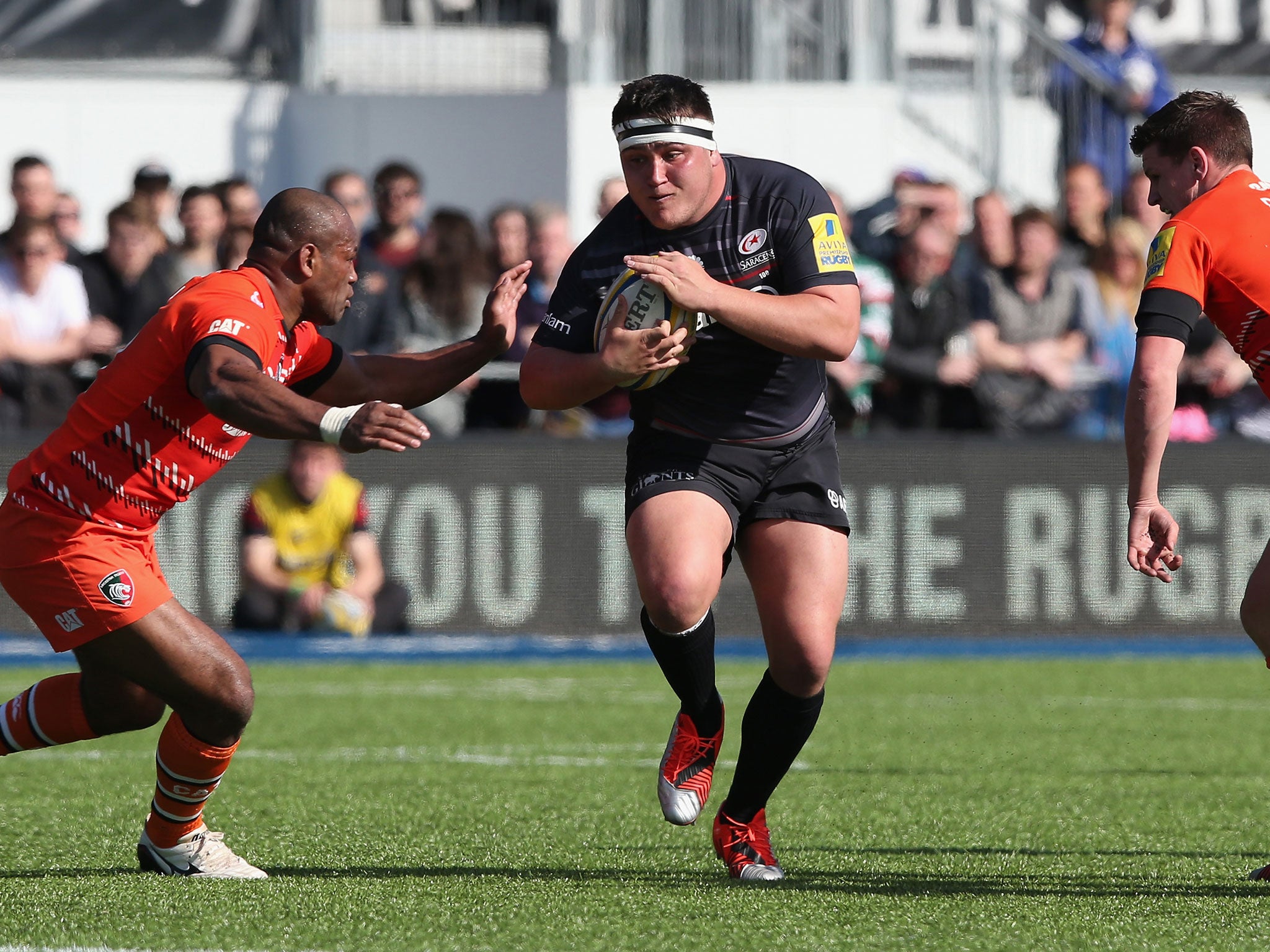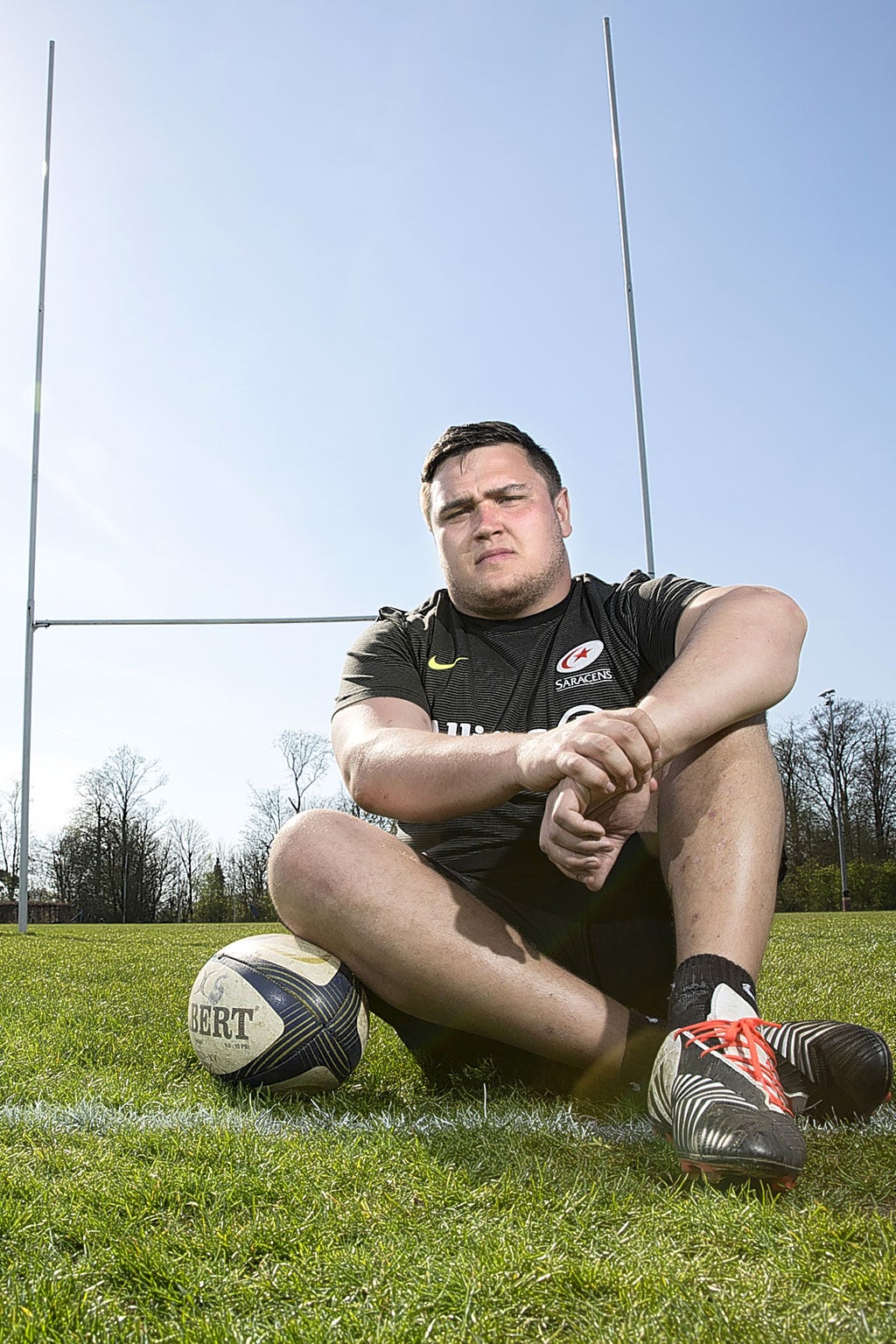Clermont Auvergne vs Saracens: Jamie George can be the saint of England
Jamie George has become Saracens’ first choice No 2 and is now the most eye-catching hooker in the country. But before he even thinks about his red rose chances and the World Cup, he tells Chris Hewett, he has a job to do against Clermont

Jamie George is too much of a natural footballer to play his rugby by numbers, but the sums are adding up all the same. The Saracens hooker put himself at the heart of his club’s astonishing defensive performance against Leicester last weekend by making 17 tackles – no mean feat for a man whose many other tasks included scrummaging against two Lions Test front-rowers and the world’s best loose-head prop – and if he delivers something similar in central France Saturday afternoon, the England selectors may be forced into a fresh calculation ahead of the World Cup.
There will be three red-rose hookers at the global gathering in September, and unless something very strange happens, Dylan Hartley and Tom Youngs will be two of them. Until recently, it seemed clear that there would be a straight fight for the remaining spot between Rob Webber of Bath, who started two Tests in New Zealand last summer, and the uncapped Luke Cowan-Dickie of Exeter. There is no such clarity now: George has succeeded in muddying the waters just as Stuart Lancaster and the rest of the red-rose hierarchy are piecing together their World Cup training squad. The 24-year-old’s timing is nothing if not impeccable.
“I know this sounds boring,” he says, shortly after listening to an unusually interesting motivational speech from the wildly successful Gaelic football manager Jim McGuinness as part of preparations for today’s European Champions Cup semi-final with Clermont Auvergne in Saint-Etienne, “but when I look at the block of club games coming up over the remaining weeks of the season, I really can’t afford to think of anything beyond Saracens.
“If something to do with England crops up, I’ll look on it as an unbelievable opportunity and try to make the most of it. But while I think I’ve put my best foot forward over the last few months, it doesn’t change the fact that this has been my first season as a starting hooker at first-team level and that there is an obvious danger in getting too far ahead of myself. I really don’t want to fall into that trap. My job now is to do what I did last week for the club, but do it better.”

Yet the fact remains: George is the most eye-catching hooker in the country, by any measure you care to apply. What is more, the rating has nothing to do with the fact that Hartley has gone deathly quiet at Northampton and Youngs keeps missing his jumpers at Leicester; or that Webber is in a slump and Cowan-Dickie is struggling for fitness yet again. Such is his form, the Saracens forward would be stacking up against any of his rivals, even if those rivals were playing the house down.
Born into a rugby family – his father Ian was a Barbarians scrum-half of note, as well as a first-team act at Northampton and London Welsh – George was still in primary school when he identified Saracens as the club of his dreams.
“I first became a fan around the time they won the cup final at Twickenham in 1998: the era of Michael Lynagh and Philippe Sella, the moment a pretty unglamorous club became big news,” he says. “I went to the Sarries summer schools as a kid. Richard Hill [a World Cup-winning flanker with England] was my idol. When they gave me my first contract, Richard was my mentor. I was completely in awe of him. Every time he spoke to me, I took a step backwards.”
Everything else was moving forwards at a rate of knots, however: George played age-group rugby for England at Under-16s, Under-18s and Under-20s; he made his senior Saracens debut and captained the club at Anglo-Welsh Cup level while still in his teens; he was a regular in the match-day squad throughout the 2010-11 campaign, when the Londoners won the Premiership title. At that point, he was understudying the Springbok hooker Schalk Brits, and it was Brits who predicted, with complete confidence, that the youngster would break into the England squad in time for the 2015 World Cup.
Then, things changed. George woke up one morning to find that a second South African hooker was joining the club. And not any old South African, either. John Smit had led his country to the world title in 2007 and to victory over the Lions in 2009, establishing himself as one of the outstanding leaders of this modern rugby age in the process. One way or another, George was suddenly up against it.
“I would be lying if I told you I didn’t feel some frustration at that point,” he confesses. “I’d had a year and a half’s progression, being in the squad alongside Schalk and coming off the bench in all the big games. I saw Schalk as one of the world’s best hookers – certainly one of the most gifted, with his handling skills and those dancing feet – so when John turned up with all that history and reputation behind him… let’s just say I could understand how for some young players, patience might run dry.
“But looking back now on an 18-month period when I didn’t play much first-team rugby, I realise I learnt more about myself and my game than at any other time in my rugby life. A lot of things had come easily to me and it may have been that I was coasting a little. Having both Schalk and John ahead of me did me a favour, because it sharpened my appetite. I worked hard on my fitness and conditioning, developed my skills and made sure that when my chance came again, I was in a good position to make the most of it.”
That chance duly arrived following Smit’s retirement in 2013, and when Brits broke down with long-term injury in the opening weeks of the current season, George was the main man. “I’m massively grateful to both John and Schalk,” he says. “I didn’t realise it at first, but John signed for Saracens on the premise that he’d spend a lot of time mentoring players, including me. As for Schalk, he sent me a text the day he picked up his injury, saying: ‘This is your time. It’s all there for you.’ And there hasn’t been a game since when I haven’t received a message of support from him. Brilliant bloke.”
It would be stretching a point to claim that George, for all his skills, can match Brits in the running-on-air, razzle-dazzle department. The man from Welwyn Garden City is, after all, a good two stones heavier than the man from the hill country to the north-east of Durban. But having played his early rugby at outside-half and then spent time in the back row – “the numbers on the shirts grew lower as my body changed shape,” he remarks with a self-deprecating snigger – he loses nothing to the South African in the handling arts.
Like the great All Black hooker Sean Fitzpatrick, he loves nothing more than rumbling down the wide channels close to the touchlines – “I suppose you could call it goal-hanging, but I do enjoy a run now and again” – and when it comes to clinging on to difficult passes in contact, he is eerily reminiscent of Hartley at his best. Yet the most striking part of his game right now is his relish for hard labour.
“That’s the thing about being a part of things at Saracens – this weird love of defence,” he says. “Let’s face it, tackling is a horrible thing to be in love with. But love it we do. We’re not ashamed to admit that defence is something that defines us as a team: it’s the thing that energises us, that gives us our buzz – when we don’t have possession, we all want to be the person who leads the line and makes the big hit.
“To me, it’s a sign of our togetherness as a group of players chasing the same goals. And it’s what makes me desperate to come to work each day. I can’t talk about the atmosphere at any other club because Saracens is all I’ve ever known, but I can tell you this: I’d come here even if I wasn’t needed for some reason. I just love being around this place.”
Join our commenting forum
Join thought-provoking conversations, follow other Independent readers and see their replies
Comments
Bookmark popover
Removed from bookmarks